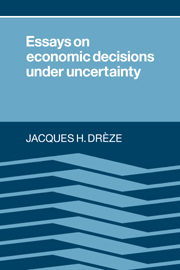Book contents
- Frontmatter
- Contents
- Acknowledgements
- Foreword
- I Decision-making under uncertainty: general theory
- II Markets and prices
- III Consumer decisions
- 8 State-dependent utility, the demand for insurance and the value of safety
- 9 Consumption decisions under uncertainty
- 10 Earnings, assets and savings: a model of interdependent choice
- IV Producer decisions
- V Theory of the firm
- IV Human capital and labour contracts
- VII Public decisions
- Index
8 - State-dependent utility, the demand for insurance and the value of safety
Published online by Cambridge University Press: 01 October 2009
- Frontmatter
- Contents
- Acknowledgements
- Foreword
- I Decision-making under uncertainty: general theory
- II Markets and prices
- III Consumer decisions
- 8 State-dependent utility, the demand for insurance and the value of safety
- 9 Consumption decisions under uncertainty
- 10 Earnings, assets and savings: a model of interdependent choice
- IV Producer decisions
- V Theory of the firm
- IV Human capital and labour contracts
- VII Public decisions
- Index
Summary
Public projects increasing safety, or entailing risks of human deaths, have inescapably raised the question: ‘How much should a society spend for the safety of its members?’; alternatively stated: ‘What is the social value of a human life?’ Answers provided by economists, public administrators and other scientists have come to be classified under two headings: The ‘human capital’ approach and the ‘willingness-to-pay’ approach. Broadly speaking, the first approach seeks an objective measure of the value of a person's life in his or her earning ability, whereas the second approach takes as its starting point the person's subjective tastes. Some of the literature is directed towards relating the two approaches and in particular towards formulating assumptions under which a person's human capital provides a lower bound to the value placed by that person on his/her life.
It seems to be now generally recognised that ‘willingness-to-pay’ is the logical approach to assessing the benefits of public safety. The approach becomes operational when coupled with the modern theory of public expenditure, initiated by Samuelson (1954). Yet, the methodological foundations of the subjective approach – state-dependent preferences – do not seem to be universally understood, leaving room for occasional doubt or error. This chapter starts (Section 1) with a review of these foundations, which involve preferences revealed through gambling, insurance and life protection. The economics of individual demand for insurance and safety are the subjects of Sections 2 and 3 respectively. The ‘public goods’ aspect is taken up briefly in Section 4.
- Type
- Chapter
- Information
- Essays on Economic Decisions under Uncertainty , pp. 153 - 181Publisher: Cambridge University PressPrint publication year: 1987

